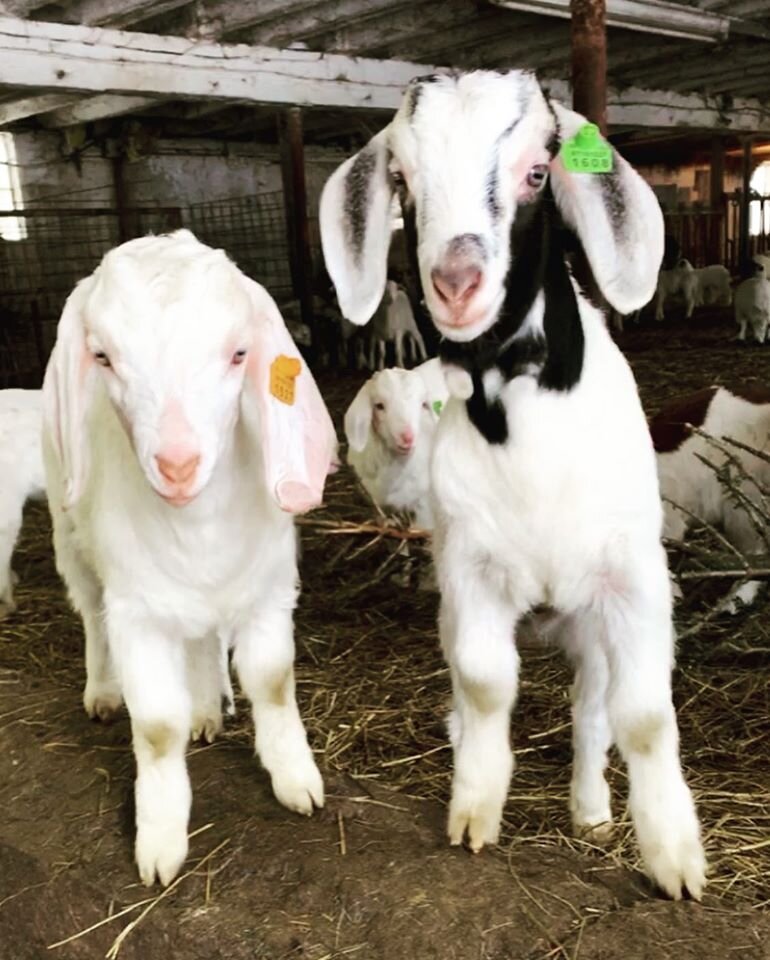Winter is for babies on our farm. Lambs and kid goats begin to arrive right around Thanksgiving, with an ebb and flow of new births continuing right on through February. Sheep and goats go into heat (also known as estrus) after the summer solstice, their internal clocks triggered by the shortening days. Five months later, POP…babies as far as the eye can see!
Not all of our ladies will go into estrus at once, or are not successfully bred right away, which is why we have babies over the course of several months. Many goat and sheep farms will actively manage their breeding programs, making sure groups are bred within a tighter timeframe. As the sole caregiver during this time, I’m rather happy to have the work spread out over a few months rather than an extremely stressful couple of weeks.
Over the years, I’ve gotten pretty good at making sure all the moms get the proper level of nutrition and are in good condition prior to bringing little babies into the world. I’ve learned to avoid plenty of problems that way. I’ve learned how to spot when someone needs a little birthing assistance and I’ve gotten rather proficient at popping a new mom into a maternity pen with her newborns to bond, a step I’m always tempted to skip because of the painstaking work involved.
But now that there are babies bopping all around the barn—some sleeping in adorable piles, others racing in circles—I spend most of my time observing their behavior in hopes of spotting potential problems so I can nip them in the bud. Are the kids full of energy with bright eyes or are do they stand back, quiet and sad? Is the mother ewe attentive to her lamb’s hunger or does the baby spend precious energy searching her out? While we try to make sure all the moms are well-fed and making ample milk for their babies, my job is nowhere near over. I must pay lots of attention to how well the babies are progressing, oftentimes literally feeling their bellies to see if they are eating enough.
During my early years of raising goats, I worked closely with fellow goat farmer Doug Bowne of Little Falls. Doug answered every one of my questions and was particularly good at helping me recognize and value my own experience as a mother, and apply it to caring for my herd. (VERY pregnant females all seem to enjoy a good back rub, human and goat alike!)
Something Doug said years ago has always stuck with me: a well-fed lamb or kid should have a nicely distended belly. It should feel like a taught water balloon, full and plump. Knowing how the belly of a healthy, happy and well-fed baby should feel allows me to quickly spot the thin and empty belly of a straggler or the watery and flaccid belly of one that could become sick.
Once I spot an empty belly, I make sure to get some milk into him or her right away. Things can go south very quickly in young animals so it is best to be proactive. Giving supplemental milk sometimes gives a little one just enough energy to get back on their mother, and the belly is full during my next round of chores. Other times, babies will require more consistent feeding; perhaps they are one of triplets or just smaller and less aggressive than a sibling. Either way, quick intervention is needed for a day or up to several weeks…and it makes all the difference.
Because I spend so many hours each day checking for full bellies, it has become a bit of an obsession that has recently spilled over into the human realm.
Food pantries have been experiencing unprecedented demand since the start of the pandemic, which means that bellies in our community are not full. As a farmer trained to spot hunger as an early warning sign, I find this troubling. As a farm manager that has learned that early intervention is key, I worry we are not doing enough.
A full belly will determine whether a baby goat survives. And I imagine a community cannot thrive while many bellies are empty. It has truly taken me years to develop a keen eye for spotting an empty belly (and even longer to know best interventions to take) amongst my goats and sheep. Thankfully, each of us can do our part by checking in with friends and neighbors and encouraging them to ask for a helping hand when needed.
From one bedraggled goat farmer, may this New Year bring full bellies for us all!
